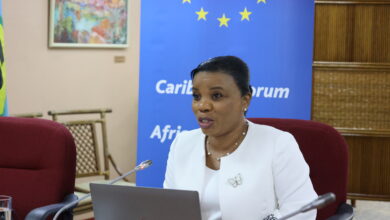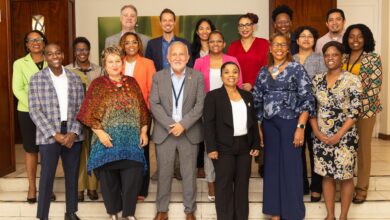(CARICOM Secretariat, Turkeyen, Greater Georgetown, Guyana) When the Twelfth Special Meeting of the Conference of Heads of Government of the Caribbean Community (CARICOM) convenes in Georgetown, on Friday 7 December, it would be the third time in as many months that the impending Economic Partnership Agreement (EPA) with the European Union has formally engaged regional leaders.
The EPA is one of two agenda items of the Special Meeting. The other is the rising food prices across the 15-member group of nations.
Exports from the Caribbean Forum of African Caribbean Pacific (ACP) States (CARIFORUM) and other ACP States have enjoyed non-reciprocal preferential access into the EU under successive Lomé Conventions and the current Cotonou Partnership Agreement. The non-reciprocal arrangements end on 31 December 2007 and the EPA is scheduled to become effective from 1 January 2008. The EPA will result in liberalized access for goods and services within the markets of the signatory countries.
In October, CARIFORUM Heads of Government and European Commission (EC) Commissioners for Trade and Development had a Special Meeting in Montego Bay, Jamaica, to review the negotiations for the EPA, narrow gaps and provide political impetus and guidance to bring the negotiations to a successful and timely conclusion. Some of the issues included the manner and pace of opening CARIFORUM markets to EU goods and services, the treatment of Sugar and Bananas, commodities of interest to the Region, government procurement, and services and investment.
That meeting had reaffirmed that the guiding objectives of the EPA negotiation were the promotion of economic development that was socially and environmentally sustainable; the reduction and eventual eradication of poverty and the smooth and gradual integration of CARIFORUM States into the world economy. Prominent in the discussions from the perspective of CARIFORUM leaders was the securing from the EU agreement for the incorporation of a meaningful development component in the EPA that will facilitate the transformation of the Region’s economies to enable CARIFORUM countries to participate meaningfully in the increasingly liberalized international trading environment
The challenges to meeting the 1 January deadline were fully ventilated at the Twenty-Fourth Meeting of the Council for Trade and Economic Development (COTED) and Fourth Meeting of the CARIFORUM Council of Ministers held in Georgetown on 15 November. The COTED/CARIFORUM Meeting, as well as the CARIFORUM/EC Commissioners meeting had identified market access for goods as the most contentious of the outstanding issues.
Given the state of the negotiations, the CARIFORUM Ministers considered the options mooted by the EC and were unanimous in determining that none of the options, including signature of a trade-in-goods agreement, with a built-in agenda for other disciplines, nor an interim agreement as defined by the EU was tenable.
The Ministers also had confirmed their commitment to continue negotiating in good faith with the objective of concluding a complete and satisfactory agreement. If this was not achieved by the end of 2007, CARIFORUM would continue the negotiations with the aim of concluding early in 2008, the Ministers said. In the light of the EC’s insistence that such an eventuality would leave the EU with no option but to subject CARIFORUM trade from 1 January 2008 to its Generalised System of Preferences, CARIFORUM Ministers had agreed on the need for a demarche at the highest political level on the EU, including its Member States and its institutions and submitted that proposal to the CARICOM Bureau of Heads for consideration at its meeting on 17 November in Barbados.
CARICOM Heads of Government subsequently conveyed to Prime Minister of the United Kingdom, Mr. Gordon Brown, their critical concerns regarding the EPA at a meeting on the periphery of the just-concluded Commonwealth Heads of Government Summit in Kampala, Uganda.





